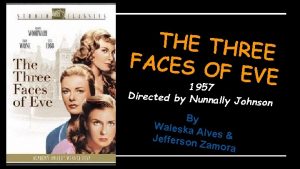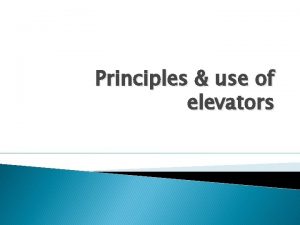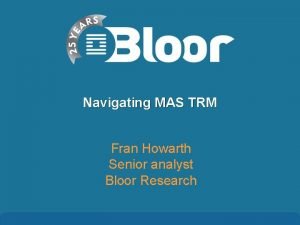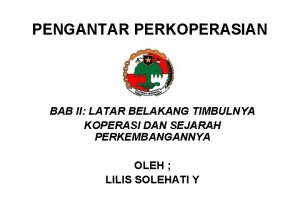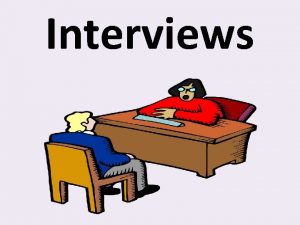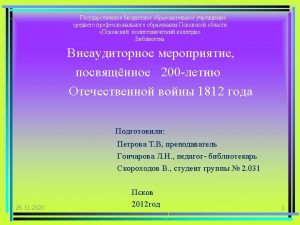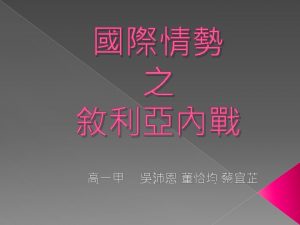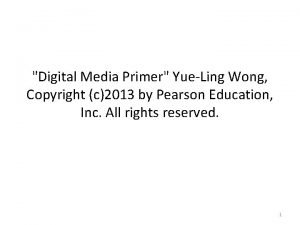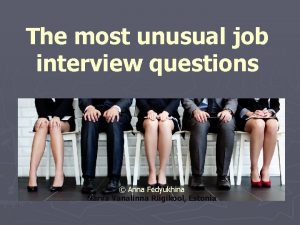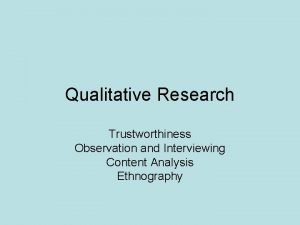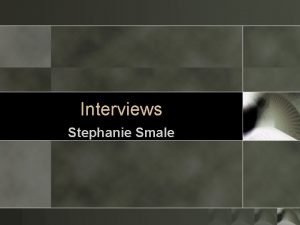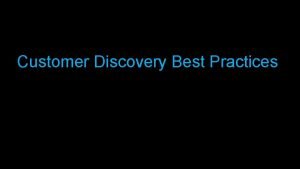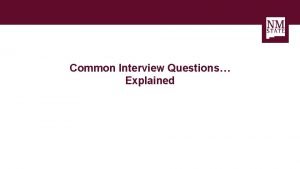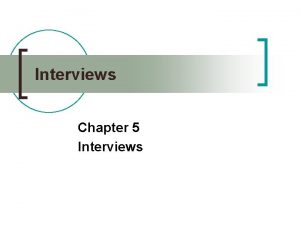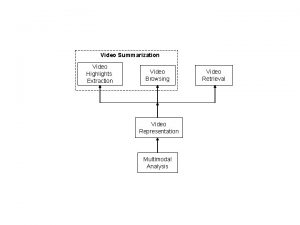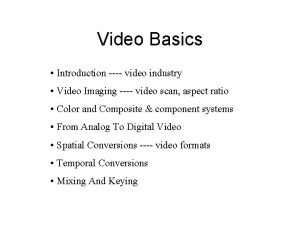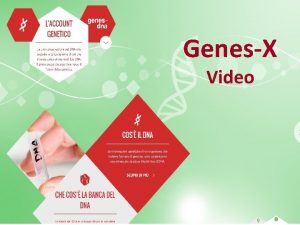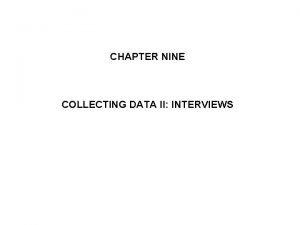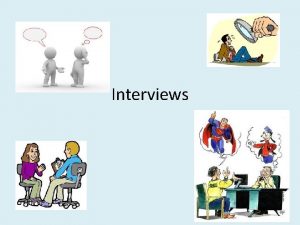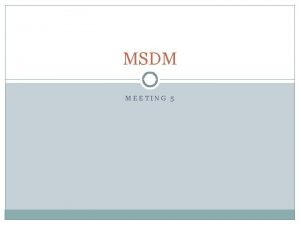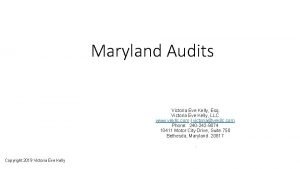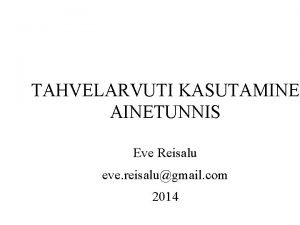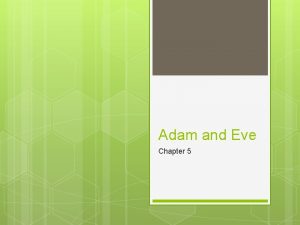Interviews Eve Howarth 1 Types of Interviews Video



















- Slides: 19

Interviews Eve Howarth  1

Types of Interviews Video Interview  2 Telephone Interview In-Person Interview

Video Interview • A video interview takes place remotely and uses video technology as the communication medium. • There are two main types of video interviews: synchronous and asynchronous. • Synchronous interviews are conducted live over the internet with both the interviewer and the candidate in attendance and are often used as an alternative to an in-person interview. • Asynchronous video interviews are recorded by the job seeker at a time convenient to them. Typically, the applicant responds to questions displayed by the video interview platform. The hiring manager is not present for the interview.  3

Video Interview Tips • Test your technology – make sure everything is working, stable internet connection, good camera and mic. • Ensure your tablet or laptop is fully charged. Avoid using mobile phone. • Dress for success – wear a professional outfit, no flashy colours. • Be in a distraction-free area, switch off phone notifications and lock the door. • Maintain good eye contact and body language. • Use hand gestures where appropriate. • Project your voice and pause where appropriate. • Smile and be friendly!  4

Eve’s Video Interview Tip • When preparing for interview, on an A 4 sheet of paper, write down all key information about the company and your prepared answers. • Then consolidate this information into a couple sticky notes. • During the video interview, stick it on your laptop or on the wall behind your laptop for referral. • BUT be careful not to constantly look at the sticky notes!  5

Telephone Interview • A telephone interview is a pre-scheduled job interview, typically lasting half an hour. • With technological advancements video interviews are becoming increasingly popular, but plenty of employers still use telephone interviews as part of their recruitment process.  6

Telephone Interview Tips • Make sure you know your CV and cover letter inside out. This is what you’ll be questioned on, after all, so make sure you’re prepared for questions about your employment and education experience. Have your CV to hand. • Be enthusiastic and sell yourself even if you do not have all the experiences or qualifications. • Use the STAR technique for competency-based interview questions. • Be in a distraction-free area, switch off phone notifications and lock the door. • Refer to your notes sparingly – do not rely heavily or keep scrunching or turning paper as recruiter can hear. • Have a glass of water nearby in case of nerves. • Dress as if you were meeting in person to put you in a professional frame of mind. • Write down any questions you want to ask. • Listen carefully to all the questions and think before answering.  7

In-Person Interview • An in-person interview refers to the face-to-face meeting of the interviewee with the interviewer. • This is a traditional mode of interview which companies are following since before the emergence of technology. • Typically a 30 minutes to one- hour long interview conducted with 2 members of the firm (Partner/Director and HR).  8

In-Person Interview Tips • Make sure you know your CV and cover letter inside out. Make sure you’re prepared for questions about your employment and education experience. • Be enthusiastic and sell yourself even if you do not have all the experiences or qualifications. • Use the STAR technique for competency-based interview questions. • Have a glass of water nearby in case of nerves. • Dress professionally. • Listen carefully to all the questions and think before answering. • Do your RESEARCH on the firm – know why you are applying for this role, this firm and location. • Pre-prepare 2 questions you will ask the interviewer at the end. • Use different examples for questions. Do not use the same one for every question. • Practice your handshake. Firm and short. • Control your body language – hand gestures, eye contact, body posture and smile! • If asked about weakness, turn it into a strength. • Speak clearly, continuously and with projection.  9

Additional Interview Tips • Reframe the way you think – instead of this is impossible, change to ‘I can do it’. • Do your preparation, ‘If you fail to prepare, prepare to fail’ • Speak to employees at the firm about their experiences. Linked. In is vital. • Do not let imposter syndrome get the better of you – you can do it! Do not give up even when questions are hard. • Use the STAR technique when answering questions. • Practice in front of a mirror, to your family, to your friends! • Do not leave the interview without having asked a question to the interviewer. You need to show your passion and enthusiasm to learn! 1  0

STAR Technique 1  1

Potential Questions to ask the interviewer • • 1  2 What’s your favourite part about working here? What are your predictions for the company over the next five years? What are the key differences between a good and a great candidate? Are there opportunities for training and progression within the company/role? If you could describe the working culture in three words, what would it be? What was one thing that surprised you when starting your work at the firm? Given your career experience, what is the biggest life lesson you would pass onto someone like me?

Interview Questions Practice 1  3

Question 1: “Tell me about yourself” Tip: Your interviewers will likely start out with a question about yourself and your background to get to know you. Start out by giving them an overview of your current position or activities, then provide the most important and relevant highlights from your background that make you most qualified for the role. 1  4

Question 2: “What are your greatest weaknesses” Tip: It can feel awkward to discuss your weaknesses in an environment where you’re expected to focus on your accomplishments. However, when answered correctly, sharing your weaknesses can show that you are self-aware and want to continuously get better at your job—traits that are extremely attractive to many employers. Remember to start with the weakness and then discuss the measures you’ve taken to improve. This way, you’re finishing your answer on a positive note. 1  5

Question 3: “What are your greatest strengths” Tip: This question gives you an opportunity to talk about both your technical and soft skills. To answer, share qualities and personal attributes and then relate them back to the role for which you’re interviewing. 1  6

Question 4: “Can you tell me about a difficult work situation and how you overcame it” Tip: This question is often used to assess how well you perform under pressure as well as your problem-solving abilities. Keep in mind stories are more memorable than facts and figures, so strive to “show” instead of “tell. ” This is also an excellent opportunity to show your human side and how you’re willing to go the extra mile without being asked. 1  7

Question 5: “What is your greatest accomplishment” Tip: It’s easy to get hung up on figuring out your single most impressive accomplishment. Instead, think of a few achievements that showcase your work ethic and values. If you can, pick examples that also tie back to the job you’re applying for. The STAR method is a great tool to ensure you highlight not only your role but how you drove business results. 1  8

Glassdoor • This is a useful site to look at past employee reviews, interviews questions people were asked etc. Make sure to check this out! • https: //www. glassdoor. co. uk/ 1  9
 Autonumy
Autonumy Lynch howarth incision
Lynch howarth incision Periosteal elevator types
Periosteal elevator types Concha bullectomy
Concha bullectomy Trm mas
Trm mas Charles howarth koperasi
Charles howarth koperasi Disadvantages of unstructured interviews
Disadvantages of unstructured interviews Yandex video b****
Yandex video b**** Yahoo search video
Yahoo search video Video.search.yahoo
Video.search.yahoo Digital media primer
Digital media primer Findings of qualitative research
Findings of qualitative research Pros and cons of face to face interviews
Pros and cons of face to face interviews Unusual job interviews
Unusual job interviews Advantages and disadvantages of ethnography
Advantages and disadvantages of ethnography What is observation in primary research
What is observation in primary research Analyse af kvalitative interviews
Analyse af kvalitative interviews Disadvantages of unstructured interviews
Disadvantages of unstructured interviews Customer interviews lean startup
Customer interviews lean startup What is your strength best answer
What is your strength best answer
